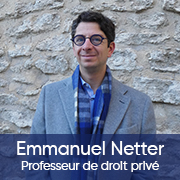[Portrait] Emmanuel Netter, Professor of Private Law at LBNC
What is your research about?
My research focuses on what is known as "digital law", a vast set of legal issues raised by the transformations caused by the computerisation and networking of society. It covers topics as diverse as the law of personal data, the law of social networks, electronic contracts and commerce, the 'uberisation' of the economy, and the supervision of so-called 'artificial intelligence' tools.

What are your current scientific activities?
I am currently co-authoring a book on the law of social networks with Mr. Valère Ndior, who has obtained an IUF chair on this topic. I am part of the team working on the second edition of the new Dalloz cybersecurity code under the direction of Mr. Michel Séjean. For a few months now, with Mr. Thibault Douville, I have been leading a new column on "Numérique et vie des affaires" in the Revue trimestrielle de droit commercial. I will soon be participating in the institution's "Midisciences" to discuss the legal framework of AI.
Why did you choose to work in academic research?
I chose this career with great enthusiasm, whereas other, more lucrative careers were open to a doctor of business law. This was mainly to enjoy the freedom to work on the subjects of my choice. For example, the university allowed me to gradually move away from my initial subjects, bank guarantees, to my current digital themes.
What advice would you give to students who want to do research?
Unfortunately, I would urge them to be careful. The freedom I mentioned earlier is being eroded: the research projects I mentioned are moving slowly because I am spending what seems to me to be an excessive amount of time on purely bureaucratic tasks. This is a problem that affects the whole profession, beyond our institution. As for the pay gap with the private sector, which was acceptable fifteen years ago, it has widened. Unfortunately, the career proposal made to our young researchers is no longer the same today.
What object or image from your business best illustrates you?
A computer would be necessary, in view of the above. But for the pleasure of the reader, who has already contemplated many, I will choose one of its ancestors: Charles Babbage's machine.
Mis à jour le 26 March 2023